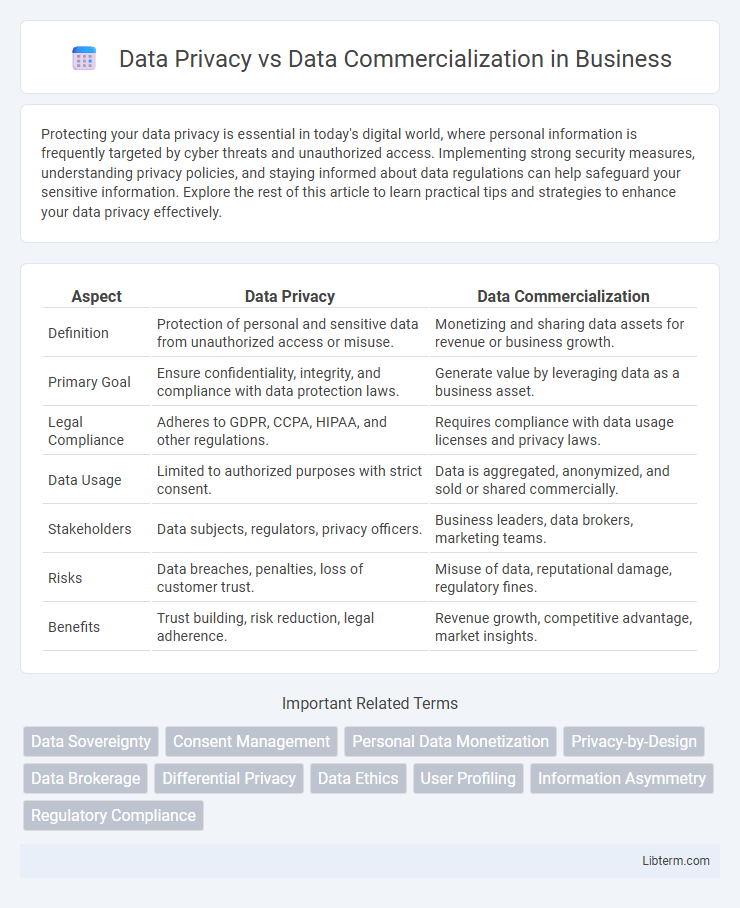Protecting your data privacy is essential in today's digital world, where personal information is frequently targeted by cyber threats and unauthorized access. Implementing strong security measures, understanding privacy policies, and staying informed about data regulations can help safeguard your sensitive information. Explore the rest of this article to learn practical tips and strategies to enhance your data privacy effectively.
Table of Comparison
| Aspect | Data Privacy | Data Commercialization |
|---|---|---|
| Definition | Protection of personal and sensitive data from unauthorized access or misuse. | Monetizing and sharing data assets for revenue or business growth. |
| Primary Goal | Ensure confidentiality, integrity, and compliance with data protection laws. | Generate value by leveraging data as a business asset. |
| Legal Compliance | Adheres to GDPR, CCPA, HIPAA, and other regulations. | Requires compliance with data usage licenses and privacy laws. |
| Data Usage | Limited to authorized purposes with strict consent. | Data is aggregated, anonymized, and sold or shared commercially. |
| Stakeholders | Data subjects, regulators, privacy officers. | Business leaders, data brokers, marketing teams. |
| Risks | Data breaches, penalties, loss of customer trust. | Misuse of data, reputational damage, regulatory fines. |
| Benefits | Trust building, risk reduction, legal adherence. | Revenue growth, competitive advantage, market insights. |
Understanding Data Privacy: Foundations and Principles
Data privacy centers on protecting individuals' personal information from unauthorized access and misuse, emphasizing principles such as consent, transparency, and data minimization. It mandates compliance with regulations like GDPR and CCPA, which enforce strict guidelines on data collection, processing, and storage to safeguard user rights. Understanding these foundations helps organizations balance ethical data handling with the potential for data commercialization, ensuring trust and legal adherence.
The Rise of Data Commercialization in the Digital Age
The rise of data commercialization in the digital age has transformed personal data into a valuable asset for businesses, driving targeted advertising, personalized services, and new revenue streams. Companies leverage big data analytics, artificial intelligence, and cloud computing to monetize user information while navigating evolving regulations like GDPR and CCPA. This surge in data-driven commerce intensifies debates around data privacy, consent, and ethical use, highlighting the need for transparent data governance frameworks.
Legal Frameworks Governing Data Privacy
Legal frameworks governing data privacy, such as the GDPR in Europe and CCPA in California, establish strict regulations on data collection, processing, and storage to protect individuals' personal information. These laws mandate transparency, user consent, and data minimization, imposing significant penalties for non-compliance, thereby shaping corporate data commercialization strategies. Compliance with such regulations is essential for businesses to balance monetization opportunities with the ethical and legal obligation to safeguard consumer privacy.
Benefits and Risks of Data Monetization
Data monetization offers significant benefits including increased revenue streams, enhanced customer insights, and improved product development through the strategic use of collected data. However, risks such as data breaches, loss of consumer trust, and regulatory non-compliance can undermine long-term business sustainability. Balancing robust data privacy measures with commercialization efforts is crucial to maximize value while mitigating legal and ethical concerns.
Key Differences Between Data Privacy and Commercialization
Data privacy restricts the collection, use, and sharing of personal information to protect individuals' rights and comply with regulations such as GDPR and CCPA. Data commercialization, in contrast, involves leveraging data assets to generate revenue through activities like data selling, targeted advertising, and analytics services. The key differences lie in data ownership, consent requirements, risk management, and the balance between individual privacy and business monetization goals.
Consumer Perspectives: Trust, Consent, and Transparency
Consumer trust hinges on transparent data practices and obtaining explicit consent, which are critical for maintaining confidence in data handling. Concerns over data privacy intensify when commercialization efforts lack clarity, undermining consumer willingness to share personal information. Prioritizing transparency and clear consent mechanisms fosters a balanced approach that respects privacy while enabling data-driven innovation.
Security Implications in Data Sharing and Selling
Data privacy challenges intensify when data is shared or sold, as sensitive information risks unauthorized access and breaches due to inadequate encryption and weak access controls. Effective security frameworks, including robust authentication protocols and data anonymization techniques, are essential to mitigate risks associated with commercializing data. Compliance with regulations such as GDPR and CCPA is critical to ensuring that data sharing and selling practices uphold user privacy rights and minimize legal liabilities.
Ethical Challenges in Balancing Privacy and Profit
Balancing data privacy and data commercialization presents significant ethical challenges, as organizations must protect individual rights while leveraging data for profit. The conflict arises when personal information is used in ways that may erode trust, leading to concerns over consent, transparency, and potential misuse. Implementing robust privacy frameworks and ethical data governance is essential to ensure commercial benefits do not compromise user privacy or autonomy.
Best Practices for Responsible Data Commercialization
Implementing best practices for responsible data commercialization involves ensuring transparent data collection methods, obtaining informed user consent, and enforcing strict data anonymization techniques to protect individual privacy. Companies should establish robust data governance frameworks that include regular privacy audits, compliance with regulations such as GDPR and CCPA, and clear data usage policies to build consumer trust. Prioritizing ethical data monetization strategies balances business growth with safeguarding personal information, minimizing risks of data breaches and reputational damage.
Future Trends: Navigating Privacy and Monetization in a Data-Driven World
Emerging technologies such as artificial intelligence and blockchain are reshaping data privacy frameworks while enabling innovative data commercialization models. Regulatory landscapes like GDPR and CCPA continue to evolve, demanding more transparent data handling practices and empowering consumer control over personal information. Companies investing in privacy-preserving analytics and consent-based data monetization are positioned to thrive in the competitive, data-driven economy of the future.
Data Privacy Infographic

 libterm.com
libterm.com